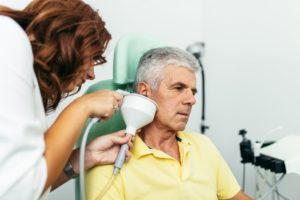
While it’s true that your ears take a beating over the years—machinery, traffic, music, leaf blowers, and daily interactions with life can all put immense stress on your ears—sometimes it can be as simple as impaction.
Impaction is the accumulation of earwax that can make hearing difficult. Cotton swabs used to be how people would take care of this, but research has indicated they likely do more harm than good. Because most people don’t pay too much attention to earwax removal, so its effect on hearing is easily ignored.
Earwax, although it might seem gross, is a self-cleaning mechanism for your ear and is required for ear health. It collects dirt, bacteria, and other pollutants from getting inside the ear canal and comes out of the ear during talking or chewing. Most people are never affected by earwax buildup, but those that are can experience symptoms like trouble hearing, a feeling of fullness in the ear, or an earache.
The best way to learn if you have is impaction or a potential ear infection is to visit the doctor, but there are some ways you can treat it at home.
Earwax softeners are ear drops that can be purchased at pharmacies. Instructions are generally to apply a few drops, wait a few minutes, then drain or rinse the ear. These products are typically made from mineral oils, baby oils, saline, or glycerin.
Cleaning out the ear with a syringe is also an option. This method involves rinsing out the ear with a water or saline solution, typically after a wax softener has been applied.
Ear candling is a relatively popular method but it presents far more risk than benefit and should be avoided.
In most cases, an earwax buildup will take care of itself. If you’re experiencing symptoms or having trouble hearing for a week or two, a visit to the doctor is recommended.